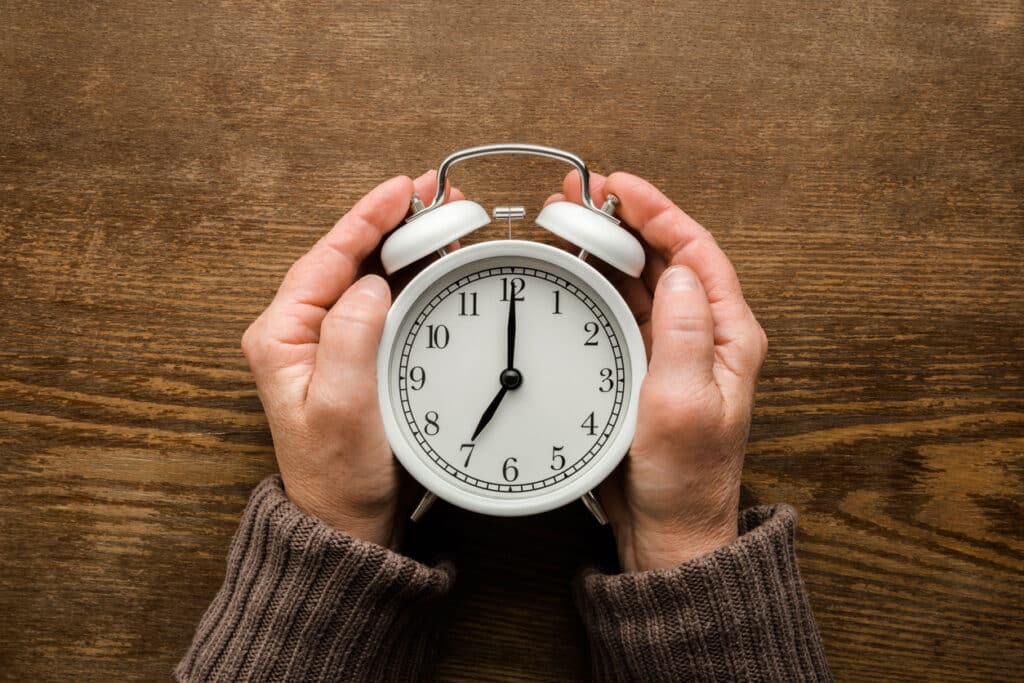
Over 60? Here’s How to Deal with the Feeling that Time is Running Out
A ticking clock in your home can affect you in ways you may not realize.
One of the primary effects of living with a ticking clock is that you are likely to feel that time is limited or running out for you. This is because the constant background ticking noise provides a continual reminder that time is passing. Your conscious mind soon learns to tune it out but your subconscious continues to hear every tick.
I’ve found this to be the case with every client I’ve ever worked with who has a ticking clock in a prominent location in their home, and there is scientific evidence for this phenomenon, too.
In one study by researchers at Florida State University, people were asked to fill out questionnaires about their ideal partner and at what age they would like to get married and have children. It was found that when there was a ticking clock in the room, women opted for getting married and having babies at an earlier age.
Those from lower socioeconomic backgrounds were the most affected, but I have found that anyone who has a ticking clock in their home is subject to feeling there is generally not enough time. Remove the clock or replace it with a silent one and the belief will usually melt away.
Feeling that Life Is Repetitive and Boring
Another effect of a ticking clock is that the monotonous, repetitive sound can cause you to feel that your existence is nothing more than a series of cycles, repeated day after day, week after week, year after year.

Some people say that they find the ticking noise comforting and enjoy having a safe, predictable life, but as Benjamin Franklin once put it, “Some people die at 25 and aren’t buried until 75.” There is so much more possible in life than doing the same things over and over again.
A Ticking Clock May Affect Your Body Rhythms
The human body has many different rhythms. We each have a unique heartbeat that is so distinctive that technology is now being developed to use it as the most secure password system ever invented. There is also the rhythm of our breath, our brainwave frequencies and our personal sleep-wake cycle. Most cells in the body have their own circadian rhythm.
External rhythms can affect these. It is well established that depriving a person of sunlight can disrupt their sleep cycle, and certain types of music can lower blood pressure and heart rate.
A study conducted by Shoko Yamane and Naohiro Matsumura in 2014 in Japan showed that having a slow ticking clock in a room has an entrainment effect that slows a person’s performance. There are likely to be many other effects that have not yet been monitored.
Solutions
A ticking clock in any part of your home will affect you but the worst place to have one is on your bedside table, or anywhere in your bedroom. You will be exposed to the sound during all the hours of sleep.
And it’s so unnecessary. Just do a Google search for “silent clock” and you will discover a whole range of readily available noise-free clocks.
Most wall clocks are battery operated these days, so it’s just a matter of finding one that goes with your decor. If you use an alarm clock, be sure to choose one that runs on batteries rather than mains electricity, for the reasons explained in this article: Why the best place for a clock radio is in your bin, not on your bedside table.
Let’s Have a Conversation:
Had you ever thought about the effect of a ticking clock? Do you have one in your home? Have you ever tried silencing it to see what a difference that makes? Please join the conversation.
Tags Getting Older







But how does a person over 60 live with the actual fact that time is running out? Tick-tocking clock in the house or not.
I think you don’t focus on time in front of you being less; you focus on the fact that you’ve had time and you have this moment. There are people who never had the chance to live to this age! I think gratitude is the starting point. I also read once that if you are focusing on tomorrow, you are not living in today. Live in today.
I find the sound of a ticking clock quite soothing.
I think I did, too. But after reading this essay, I’m thinking that maybe it’s more like living with a monster in the house.
I love a ticking clock…I have an old antique grandmother clock (vs a grandfather clock) that has a key that winds levers at the back…it has a gentle chime on the quarter hour and has a beautiful ring on the hour. It reminds me of the big clock in my college library. The tick-tock is slow and steady…its like the heartbeat of my home and is grounding and centering. I love coming home to the sound. It does slow things down, in the most beautiful and centering way! I have never labelled the tick-tocking as time marching on, but rather as the reminder to be present in each moment and to feel and hold each moment close for the gift it is. Love a ticking clock!
I had to silence the chimes on my grandfather clock because that sound was having the same effect on me every hour on the hour!
Me, too. And the pendulum. I just like looking at the handsome old grandfather clock,
quiet and stoic.